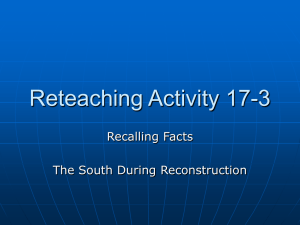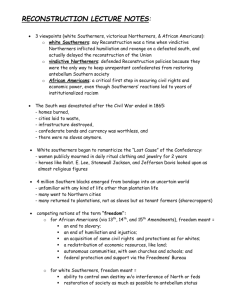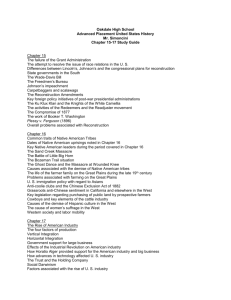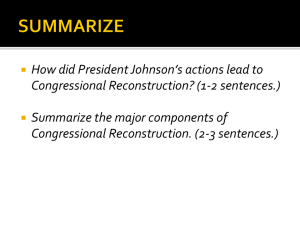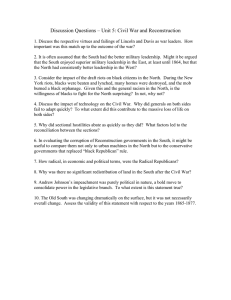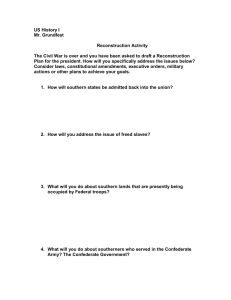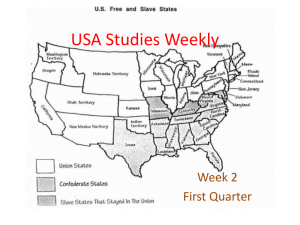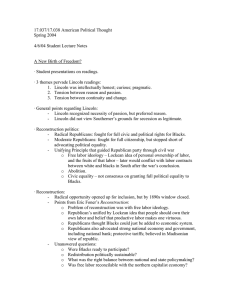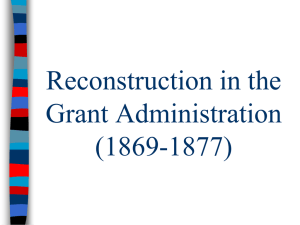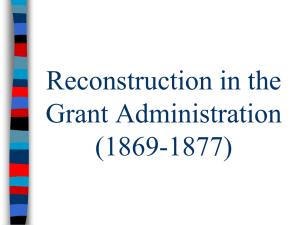Powerpoint of first lecture on Historical Context
advertisement
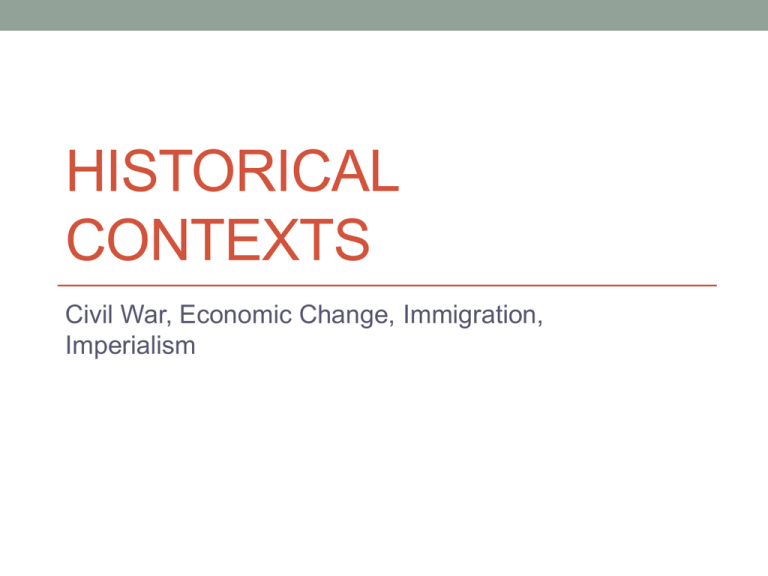
HISTORICAL CONTEXTS Civil War, Economic Change, Immigration, Imperialism Civil War Reporting and Photos shocked the nation Legacy of the Civil War • How bad was the violence? • Numbers killed: 1,030,000 casualties • 620,000 soldier deaths—two-thirds by disease • As many American deaths as all American deaths in other U.S. wars combined • How did they try to patch things up after the war? • Johnson 20,000 U.S. Army troops stayed to protect former slaves & make • • • • sure Southerners didn’t try to re-start war Took over gov’ts, rebuild the south, sign loyalty oaths Gave land to some ex-slaves in S. Carolina Johnson tried to make it easy for southerners, but “radical republicans” rejected his ideas & over-rode his vetoes (1867) Radical Republicans removed all southern governments, put their own people in (carpetbaggers) • Radical reconstruction offered massive aid for railroads, built public schools, and raised taxes End of Reconstruction (1877) • 2 reasons why Reconstruction ended in the south • Southern opposition (often violent, KKK) • Economic instability meant republicans (liberals then) lost congress & democrats came back representing both northern and southern states • Political re-unification • All southern states re-admitted union and government representation by 1870 • All southerners pardoned of treason in 1872. • Unfinished Reconstruction work • North basically said “fine, you do it then” even though the work of rebuilding was far from over and blacks still needed legal and police protection. Rise of the KKK Status of former slaves • Slavery ended for the Confederacy's 3.5 million blacks • Bumpy transition into new “free” status • Share cropping, convict lease system • Allowed slavery to continue under new names • Lynching, marginalization, whole towns of blacks burned down • 1898—161 blacks lynched in the south • In 1870 the KKK is outlawed as a “terrorist organization” • It’s revived in big numbers as a secret club at the turn of the century after the film Birth of a Nation • “Jim Crow” laws & Plessy v. Ferguson 1896 • Accommodation of white southerners (U.S. sold out new black citizens to patch things up with white south) Economic Change • Transportation and manufacturing change the country completely • From family farms & workshops to factories & agribusiness • First Transcontinental railroad 1869 • Wagons took 2-3 months; trains a couple days • Goods get to markets much faster, so people can sell much more stuff, esp. farm products that would spoil otherwise • Ended plains Indians way of life and cut in ½ the buffalo path of migration • Telegraph comes to small towns • Electricity on a larger scale • Mineral wealth: coal, oil, iron, gold (rush 1849), silver • Monopolies emerge in many industries (robber barons) • Carnegie in steel—vertical integration (mines to sheet metal) • Leads to “Gilded Age” (Twain’s term) of “conspicuous consumption” • Ideal man is bearded (= no syphilis!) and rather fat • The economy overall climbs, but with some terrible crashes in 1873 and 1890s • No public welfare system—unemployed simply starved or maybe church helped. Westward Expansion and Transcontinental Railroad Immigration • Nation needed more people to keep up with economic growth (and depress wages) • Why does the Statue of Liberty (erected 1886) want the “tired, poor huddled masses” • City populations exploded with new immigrants from Italy, Ireland, Poland, Russia, etc. • Population growth: 1870 US. = 38.5 million; 1910 pop = 92 Million; 1920 pop = 123 million • 27.5 million total immigrants arr. From 1865-1918 • New class and ethnic divisions due to immigration • Incredible wealth of Carnegie, JP Morgan, Rockefeller, Vanderbilt • Contrast to immigrant slums—new to American life as factories were new • Urban immigrant workers hideously exploited—12 to 16 hour days, not enough to live on, dangerous conditions, etc. • Workers tried to organized to get fair working conditions, but they were violently repressed • Right to strike not recognized until 1930s • Homestead Act 1862 • Promised land to any family that would “improve” it • Land actually went to speculators most of the time Tenements & Factories American Imperialism • Conquest of continent complete in 1848 • Brought a lot of that mineral wealth (gold rush in 1849) • End of Frontier • Census says no place in America has les than 2 people per square mile—everywhere is settled, discovered. • Native people pushed onto reservations • Suddenly anthropologists want to study them • Dawes Act ends collective holding of land • Devastating to culture and economic well-being • New acquisitions overseas • Stepped into Spanish-American war • Used victory to take over Cuba, Puerto Rico and Philippines • Twain HATED this—worse than Iraq • Also took over Hawaii—annexed in 1898 due to the influence of big planters there Indian Wars and Imperialism What this all means for literature: • Themes and issues writers take up are different than the ones that interested the early settlers. • More economic/material focus, less spiritual & romantic • Leads to literary movement known as Realism • Contact with more and different people, so trying to understand our differences and basic human nature become urgent concerns. • Leads to literary movement known as Naturalism
